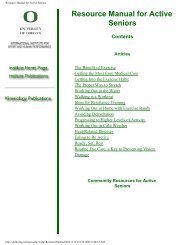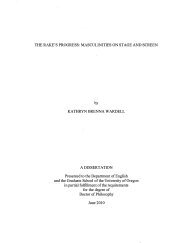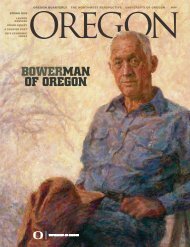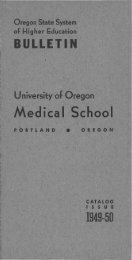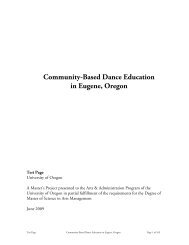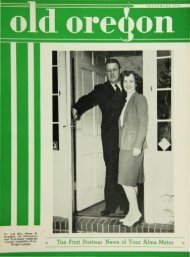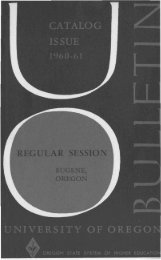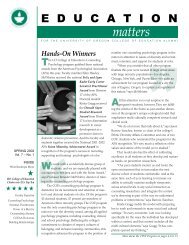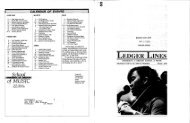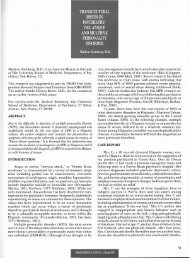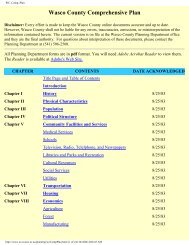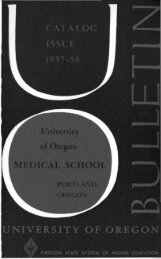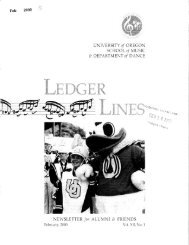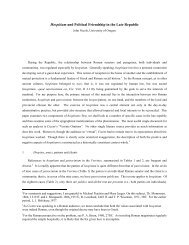- Page 2 and 3:
UNIVERSITY OF OREGON BULLETIN NUMBE
- Page 4:
i tt, I\ UNIVERSITY OF OREGON REGUL
- Page 8 and 9:
State Board of Higher Education Ter
- Page 10:
September 1964 S MTWT F S 1 2 3 4 5
- Page 16:
14 UNIVERSITY OF OREGON PAUL R. BEI
- Page 20:
18 UNIVERSITY OF OREGON ALBUREY CAS
- Page 23 and 24:
FACULTY 21 RICHARD H. DESROCHES, Ph
- Page 25 and 26:
FACULTY 23 GEORGE ESSAYIAN, M.F.A.,
- Page 27 and 28:
RALPH J. GIBBS, Lecturer in Archite
- Page 29 and 30:
FACULTY 27 EDWARD C. HARMS, JR., B.
- Page 31 and 32:
FACULTY 29 EVELYN R. HUMPHREY, B.A.
- Page 33 and 34:
FACULTY 31 *SYLVAN N. KARCHMER, M.F
- Page 35 and 36:
FACULTY 33 SILVY A. KRAUS, Ph.D., A
- Page 37 and 38:
FACULTY 35 *VAL R. LORWIN, Ph.D., P
- Page 41:
FACULTY 39 FREDERICK J. MOREAU, LL.
- Page 45 and 46:
FACULTY 43 DONALD R. PORTER, D.D.S.
- Page 47 and 48:
FACULTY 45 WILLIAM S. ROBINSON, Ph.
- Page 49 and 50:
FACULTY 47 *PHIL SCHOGGEN, Ph.D., A
- Page 51 and 52:
FACULTY 49 WARREN E. SMITH, Ed.D.,
- Page 53 and 54:
FACULTY 51 KESTER SVENDSEN, Ph.D.,
- Page 55 and 56:
FACULTY 53 KARMEN K. D. VAN DYKE, B
- Page 57 and 58:
FACULTY 55 RICHARD CAMPBELL WILLIAM
- Page 59 and 60:
General Information History of the
- Page 61 and 62:
LIBRARIES 59 Until the 1920s the ea
- Page 63 and 64:
LIBRARIES 61 extensive collection o
- Page 65 and 66:
MUSEUMS AND COLLECTIONS 63 the work
- Page 67 and 68:
Academic Regulations Admission TO B
- Page 69 and 70:
ENTRANCE EXAMINATIONS 67 Credit tra
- Page 71 and 72:
(1 ) Written English: DEGREES 69 (a
- Page 73 and 74:
GROUP REQUIREMENT 71 Application fo
- Page 75:
REGISTRATION PROCEDURE 73 Honor Soc
- Page 78 and 79:
76 ACADEMIC REGULATIONS Regular Fee
- Page 80:
78 ACADEMIC REGULATIONS of his pare
- Page 83 and 84:
STUDENT LIVING Student Living COMFO
- Page 85 and 86:
STUDENT LIVING Cooperative Houses S
- Page 87 and 88:
STUDENT HEALTH SERVICE 85 RICHARD K
- Page 90 and 91:
88 STUDENT LIFE AND WELFARE Mary Sp
- Page 92 and 93:
90 STUDENT LIFE AND WELFARE Coed Ho
- Page 94 and 95:
92 STUDENT LIFE AND WELFARE Jones,
- Page 96 and 97:
94 STUDENT LIFE AND WELFARE Archite
- Page 98 and 99:
96 STUDENT LIFE AND WELFARE funds p
- Page 100 and 101:
98 STUDENT LIFE AND WELFARE fession
- Page 102 and 103:
100 STUDENT LIFE AND WELFARE Haycox
- Page 104 and 105:
102 STUDENT LIFE AND WELFARE topics
- Page 106 and 107:
Graduate School *HARRY ALPERT, Ph.D
- Page 108 and 109:
106 GRADUATE SCHOOL another institu
- Page 110 and 111:
108 GRADUATE SCHOOL For the master'
- Page 112 and 113:
110 GRADUATE SCHOOL The requirement
- Page 114 and 115:
112 GRADUATE SCHOOL Master of Music
- Page 116 and 117:
114 GRADUATE SCHOOL Advancement to
- Page 118 and 119:
116 GRADUATE SCHOOL SIDNEY A. BERNH
- Page 120 and 121:
118 GRADUATE SCHOOL partments in th
- Page 122 and 123:
Honors College CHARLES E. JOHNSON,
- Page 124 and 125:
122 HONORS COLLEGE Anthropology. Se
- Page 126 and 127:
College of Liberal Arts CHARLES E.
- Page 128 and 129:
126 COLLEGE OF LIBERAL ARTS first t
- Page 130 and 131:
128 COLLEGE OF LIBERAL ARTS The gen
- Page 132 and 133:
130 COLLEGE OF LIBERAL ARTS 321, 32
- Page 134 and 135:
132 COLLEGE OF LIBERAL ARTS Anth 44
- Page 136 and 137:
134 COLLEGE OF LIBERAL ARTS Assista
- Page 139 and 140:
BIOLOGY 137 Bi 426. Evolution. (G)
- Page 141:
CHEMISTRY 139 Bi 537, 538, 539. Adv
- Page 144 and 145:
142 COLLEGE OF LIBERAL ARTS LOWER-D
- Page 146 and 147:
144 COLLEGE OF LIBERAL ARTS GRADUAT
- Page 148:
146 COLLEGE OF LIBERAL ARTS Term Ho
- Page 151 and 152:
ECONOMICS 149 Ec 414,415,416. Regio
- Page 154 and 155:
152 COLLEGE OF LIBERAL ARTS SELIG,
- Page 156 and 157:
154 COLLEGE OF LIBERAL ARTS *Eng 10
- Page 159 and 160:
ENGLISH 157 Eng 588, 589. Modern Po
- Page 162 and 163:
160 COLLEGE OF LIBERAL ARTS hours b
- Page 164 and 165:
162 COLLEGE OF LIBERAL ARTS CL 505.
- Page 166 and 167:
164 COLLEGE OF LIBERAL ARTS sentati
- Page 168 and 169:
166 COLLEGE OF LIBERAL ARTS and sty
- Page 170 and 171:
168 COLLEGE OF LIBERAL ARTS RL 549.
- Page 172 and 173:
170 COLLEGE OF LIBERAL ARTS ROMANCE
- Page 174 and 175:
172 COLLEGE OF LIBERAL ARTS Honors.
- Page 177 and 178:
GEOLOGY 175 Methods (Geol 393); Fie
- Page 179:
GEOLOGY 177 Geo1491. Structural Geo
- Page 182 and 183:
180 COLLEGE OF LIBERAL ARTS Hst 421
- Page 184 and 185:
182 COLLEGE OF LIBERAL ARTS GRADUAT
- Page 186 and 187:
184 COLLEGE OF LIBERAL ARTS develop
- Page 189:
MATHEMATICS UPPER-DIVISION COURSES
- Page 192:
190 COLLEGE OF LIBERAL ARTS Mth 478
- Page 196 and 197:
194 COLLEGE OF LIBERAL ARTS Phi 416
- Page 198 and 199:
196 COLLEGE OF LIBERAL ARTS propert
- Page 200 and 201:
198 COLLEGE OF LIBERAL ARTS Ph 524,
- Page 202 and 203:
200 COLLEGE OF LIBERAL ARTS nations
- Page 204 and 205:
202 COLLEGE OF LIBERAL ARTS economi
- Page 206 and 207:
204 COLLEGE OF LIBERAL ARTS Since t
- Page 208 and 209:
206 COLLEGE OF LIBERAL ARTS UPPER-D
- Page 210:
208 COLLEGE OF LIBERAL ARTS Advance
- Page 213 and 214:
SOCIOLOGY 211 R 423, 424, 425. Cont
- Page 215 and 216:
SOCIOLOGY 213 (Soc 438) ; Political
- Page 217 and 218:
SOCIOLOGY 215 Soc 342, 343. Social
- Page 219 and 220:
SOCIOLOGY 217 political trends and
- Page 221 and 222:
SPEECH Speech Professors: GLENN STA
- Page 223 and 224:
SPEECH 221 UPPER-DIVISION COURSES S
- Page 225 and 226:
SPEECH 223 GRADUATE COURSES *Sp 501
- Page 227 and 228:
SPEECH 225 Sp 315. Costume Workshop
- Page 229 and 230:
School of Architecture and Allied A
- Page 231:
ARCHITECTURE AND ALLIED ARTS Master
- Page 234 and 235:
232 PROFESSIONAL SCHOOLS UPPER·DIV
- Page 236 and 237:
234 PROFESSIONAL SCHOOLS AA 407. Se
- Page 238 and 239:
236 PROFESSIONAL SCHOOLS civic desi
- Page 240 and 241:
238 PROFESSIONAL SCHOOLS Fourth Yea
- Page 242 and 243:
240 PROFESSIONAL SCHOOLS AA 509. Te
- Page 244 and 245:
242 PROFESSIONAL SCHOOLS AA 457. Ad
- Page 247 and 248:
ARCHITECTURE AND ALLIED ARTS 245 A
- Page 249 and 250:
School of Business Administration R
- Page 251 and 252:
BUSINESS ADMINISTRATION 249 Current
- Page 253 and 254:
BUSINESS ADMINISTRATION Senior Year
- Page 255 and 256:
BUSINESS ADMINISTRATION 253 equity
- Page 257 and 258:
BUSINESS ADMINISTRATION 255 models
- Page 259 and 260:
BUSINESS ADMINISTRATION 257 Majors
- Page 261 and 262:
BUSINESS ADMINISTRATION 259 interes
- Page 263 and 264:
BUSINESS ADMINISTRATION 261 UPPER·
- Page 265 and 266:
BUSINESS ADMINISTRATION 263 Term Ho
- Page 267 and 268:
BUSINESS ADMINISTRATION 265 jective
- Page 269 and 270:
BUSINESS ADMINISTRATION 267 MIT 467
- Page 271 and 272:
BUSINESS ADMINISTRATION 269 ELECTIV
- Page 273 and 274:
BUSINESS ADMINISTRATION Division of
- Page 275 and 276:
BUSINESS ADMINISTRATION 273 Student
- Page 277 and 278:
BUSINESS ADMINISTRATION 275 Ac 540.
- Page 279 and 280:
BUSINESS ADMINISTRATION 277 money m
- Page 281 and 282:
BUSINESS ADMINISTRATION 279 PIM 533
- Page 283 and 284:
School of Education PAUL B. JACOBSO
- Page 285 and 286:
EDUCATION 283 for use in the classr
- Page 287 and 288:
EDUCATION Elementary Education THE
- Page 291 and 292:
EDUCATION 289 Ed 408. Special Secon
- Page 293 and 294:
EDUCATION 291 Ed 428. Psychology of
- Page 295 and 296:
EDUCATION 293 Ed 409. Practicum. (G
- Page 297 and 298:
EDUCATION 295 GRADUATE COURSES *Ed
- Page 299 and 300:
EDUCATION GRADUATE COURSES Ed 507.
- Page 301 and 302: EDUCATION 299 Lib 486. Introduction
- Page 303 and 304: School of Health, Physical Educatio
- Page 305 and 306: HEALTH, PHYSICAL EDUCATION, RECREAT
- Page 307 and 308: HEALTH, PHYSICAL EDUCATION, RECREAT
- Page 309 and 310: HEALTH, PHYSICAL EDUCATION, RECREAT
- Page 311 and 312: HEALTH, PHYSICAL EDUCATION, RECREAT
- Page 313 and 314: HEALTH, PHYSICAL EDUCATION, RECREAT
- Page 315 and 316: HEALTH, PHYSICAL EDUCATION, RECREAT
- Page 317 and 318: HEALTH, PHYSICAL EDUCATION, RECREAT
- Page 319 and 320: HEALTH, PHYSICAL EDUCATION, RECREAT
- Page 321 and 322: HEALTH, PHYSICAL EDUCATION, RECREAT
- Page 323: School of Journalism JOHN L. HULTEN
- Page 327 and 328: JOURNALISM 325 UPPER-DIVISION COURS
- Page 329 and 330: J 505. Reading and Conference. Hour
- Page 331 and 332: LAW 329 with the system of grade-po
- Page 333 and 334: LAW 331 determination used by the U
- Page 337 and 338: LAW 3J5 *L 507. Seminar. Hours to b
- Page 339 and 340: School of Music ROBERT M. TROTTER,
- Page 341: SCHOOL OF MUSIC 339 Fees for the us
- Page 344 and 345: 342 PROFESSIONAL SCHOOLS Mus 190. P
- Page 346: 344 PROFESSIONAL SCHOOLS instrument
- Page 349 and 350: SCHOOL OF MUSIC 347 MuE426. The Gen
- Page 351: Department of Military and Air Scie
- Page 355 and 356: Summer Sessions PAUL B. JACOBSON, P
- Page 358: 356 ENROLLMENT AND DEGREES ENROLLME



